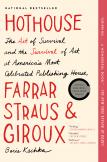Inside Story
To review a book about a publishing house seems a rather dreary assignment. Who but the most ardent bibliophiles care about print runs and author advances? Does it really matter what appeared in the fall catalogue of 1963? But when the publishing house is home to Nobel Prize-winners and Pulitzer darlings and run by a Guggenheim, well, then things get a little more interesting. Add to the mix a brilliant, Jesuit-educated editor who worked with Thomas Merton and Flannery O’Connor, and for the Catholic reader, the story may be worth a look after all.
Hothouse is the story of Farrar, Straus & Giroux, or FSG in the argot of the publishing world. Boris Kachka, a writer for New York magazine, attempts to confer a “Mad Men” style sexiness on the dowdy world of publishing. And in Roger W. Straus Jr., cofounder of the respected publishing house and son of Gladys Guggenheim, he has his Don Draper, a debonair entrepreneur who flirts with female staff, holds court at the Union Square Café and lunches with Seamus Heaney and Derek Wolcott. Known for his outsized personality and colorful cravats, Straus held a decades-long literary salon that stretched from FSG’s offices in Union Square to his home in Purchase, N.Y., to his sojourns to the Frankfurt Book Fair every fall.
FSG did not have the financial resources of, say, a Random House, but Straus was more interested in prestige anyway, an elusive asset that he set out to accumulate in a surprisingly shrewd way. FSG’s authors did not always sell many books, but they were always reviewed in The New York Times. Authors like Susan Sontag, Joan Didion and Philip Roth brought to the house a literary value that helped lure other well-respected writers. Tom Wolfe and Scott Turow were top sellers, helping keep the house afloat in lean years. Today’s crop of talent includes Jonathan Franzen and Jeffrey Eugenides, as well as Alice McDermott and Paul Elie, two Catholic authors who, one can assume, take pride in writing for a house that once published Merton and O’Connor.
Elie has a special connection with Farrar, Straus & Giroux. A graduate of Fordham University, he worked at FSG for many years and published two books with them, including The Life You Save May Be Your Own, an epic study of four mid-century Catholic writers. That three of those writers—Merton, O’Connor and Walker Percy—found a home at FSG is no coincidence. In later years, Elie was FSG’s liaison to Robert Giroux, the final addition to FSG’s eponymous triumvirate.
A native of New Jersey who attended the Jesuit-run Regis High School in Manhattan, Giroux was confidant and editor to T. S. Eliot and Thomas Merton, among others. He helped bring Seven Storey Mountain to fruition and was among the first to read Catcher in the Rye, a book his boss at Harcourt, Brace turned down. While at Harcourt, he published Jack Kerouac’s first book, though he didn’t know what to make of a second novel the mercurial writer delivered to his offices on a single roll of paper. When Giroux told him they would need separate pages for editing, Kerouac reacted with indignation and stormed off. On The Road was published by Viking six years later.
Giroux joined FSG in 1955 and stayed for the rest of his career. Unfortunately, he fails to come alive in these pages, not surprising given the ink devoted to his more extroverted partner, Straus. Yet Giroux was obviously a “damned good editor,” in Straus’ words, and helped bring in some of FSG’s most notable writers, including Robert Lowell, Bernard Malamud and John Berryman. “The most sobering of all publishing lessons,” he once said, is that “a great book is often ahead of its time, and the trick is how to keep it afloat until the times catch up with it.” In the case of Flannery O’Connor, Giroux did just that, helping to drawing attention to a writer who died before receiving the recognition she deserved.
Giroux’s letters are now at Loyola University in New Orleans, a deal made possible through Patrick Samway, S.J., a biographer of Walker Percy and former literary editor of America. Samway was a close friend of Giroux, and probably could shine a brighter light on the legacy of this brilliant and complicated man, who was briefly married but spent most of his life living next door to a male friend he knew since childhood. Readers will have to wait for a more sensitive portrait to emerge.
Meanwhile, we have the story of a plucky publishing house that still cares a good deal about discovering the next great book. FSG may no longer be independent (they were sold to a German publishing powerhouse in 1994), but they still cultivate a contrarian spirit under the editorship of Jonathan Galassi. How they will fare in the age of Amazon is anyone’s guess. But if you care about good books, and the ideas they bring to the public conversation, then this is a story we can all hope will not end anytime soon.
This article also appeared in print, under the headline “Inside Story,” in the Sept. 1-8, 2014, issue.








